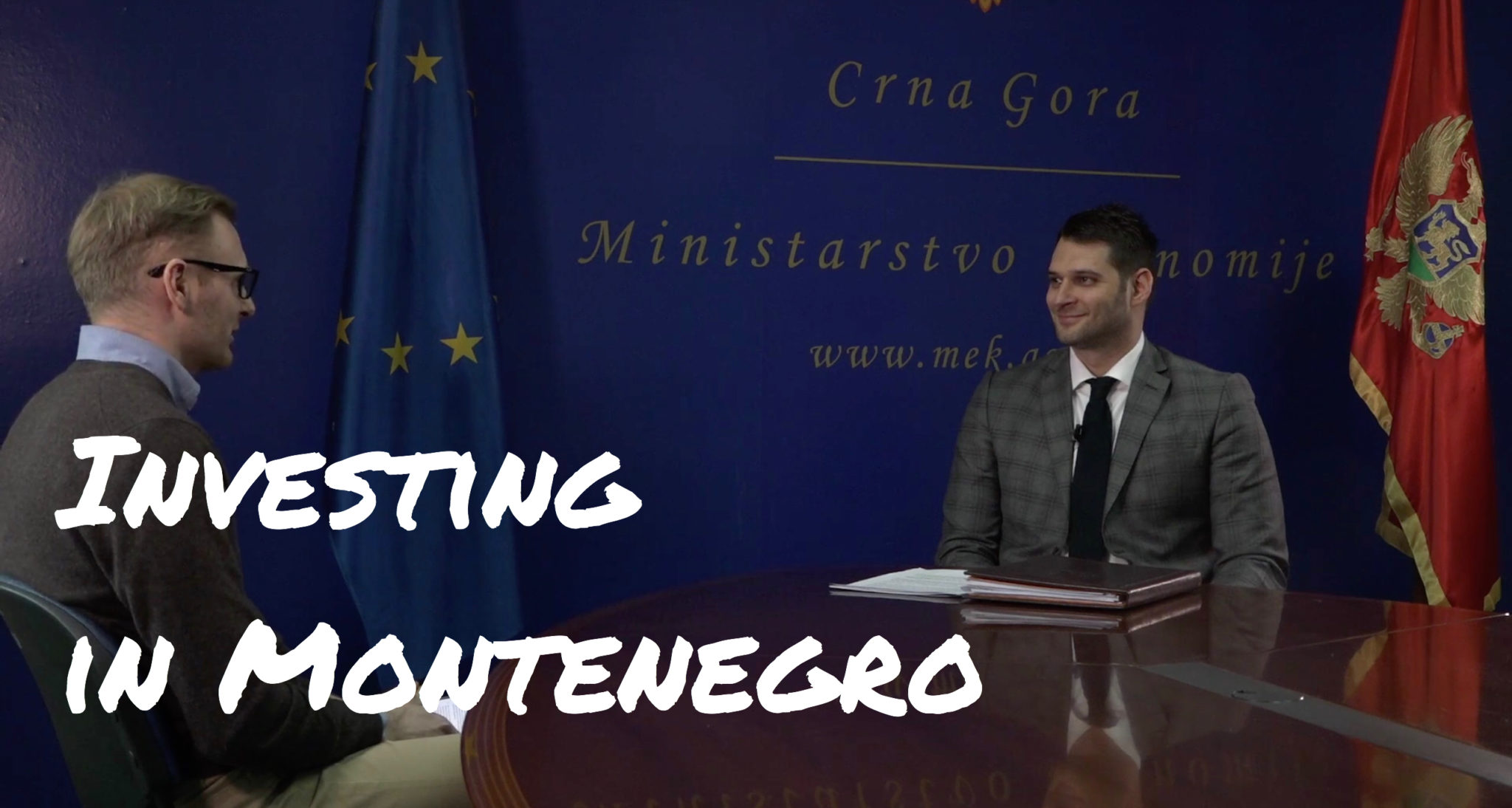Watch full interview on YouTube
Within the globalization, many international companies are looking for the new markets and territories to expand their businesses and expertise. The boundaries are also becoming blurred for the small enterprises and start-ups. Montenegro is relatively small country, but read what it has to offer to those enterpreneurs, who decide to start a business here.
SV: Radosav, you are the director of the new Directorate for Investment, SME Development, and EU Funds Management. Could you please tell us more about the department’s mission? What are your goals and time frames?
RB: Firstly, it’s good to have you here at the premises of the Ministry of Economy of Montenegro. Once again, thank you so much for being here and thank you for recognizing the importance of this sector in Montenegro and the importance of this conversation. Like you said, starting from January 2018 we have created a new directorate within the Ministry of Economy, which is called the Directorate for Investment, Development of Small and Medium Enterprises and Management of EU Funds. We, as the government of Montenegro, had recognized the importance of this sector quite a long time ago, and we had been very active in this regard in the past as well. But we realized that some of those activities were quite dispersed. They were performed by several different organizational units, not only within this ministry but also within other organizational units and organizations in the public sector. By creating this big directorate, which has five different departments, we have created, what we like to call, a one-stop-shop within the Ministry of Economy. Entrepreneurs, who are starting up and even before starting up, when they’re still at the stage of thinking about starting a business in Montenegro, companies that are already operating or large multinational companies can get any information they may need at any given moment. With this big directorate, we have five different departments. One deals with investors, mostly with foreign investors. Another with the programs that are related to the development of small and medium enterprises. The third department is dealing with the management of pre-accession EP funds (in that organizational unit we are focusing more on the parts that are related to competitiveness and innovation). The fourth directorate is dealing with EU funds but related to bi-lateral and tri-lateral and other programs. And the last, but not the least, is the fifth department that is there to support the business community by always having an open door and being there as a primary entry where people from the private sector can have direct communication with them, ask any questions, and get firsthand information right away. So, we believe that by forming this directorate, we will do our job more efficiently, more promptly, and that we’ll make the life of entrepreneurs even easier. We came up with this idea shortly after we started a program, which had a goal for us as a ministry together with the Minister of Economy Mrs. Dragica Secular as the lead, to visit all the municipalities in Montenegro and to talk directly with the entrepreneurs. What we realized was that they would rather have one address where they can ask any question, rather than several different addresses. So, we are very excited about the future work that we will do and, so far, in such a short period of time, we’ve already received positive feedback coming from representatives of the private sector in Montenegro.
SV: What resources would entrepreneurs, who are looking to invest in Montenegro, use to get all their questions answered? Is your directorate the right channel to lead them through the process?
RB: That’s a very good question. Thank you so much for asking that question. Of course, we have several different websites and several different online sources through which foreign investors, who are not currently in Montenegro, can find any information they may need. Starting with the official website of the Ministry of Economy, where they can find information about what the directorate is doing and where they can find information about other directorates and activities at the administration level. We have three or four different websites, depending on what they need, where they can find all the necessary information. I would like to mention the website www.investmentlocations.me, which is a very useful website for a foreign investor. In case they need clarification, our email addresses are stated on the site with the phone numbers so that they can have direct online communication with us through those channels as well.
SV: Montenegro is a rapidly growing economy in the Balkans today. To what do you attribute such success and why do you think it is moving so fast?
RB: I would say that there are several aspects, which are related to that. Firstly, I believe, it’s the political policies that the government followed during the past period, not only after we gained our independence, but even during the period when we were taking the necessary steps to prepare ourselves for sovereignty. I would include the actions that we’re taking right now in relation to the integration process. I would also say that it is very closely related to the fact that we joined NATO and that in fact, economically, we are a very stable country. It’s also equally important that we have breathtaking landscape and beautiful mountains that allow us to further strengthen and develop tourism during the winter months. We have beautiful beaches and access to the sea, which allows us to develop tourism during the summer months as well. And we also have a very nice piece of land in the central region, which is very good for the development of agricultural sectors. We have two international airports and four ports. And, not to mention other things as well, we, as a country, are really doing a lot of hard work by investing a lot of time and resources into creating not only a stable and a good business environment, but also programs from which new investors and existing investors can have direct financial or non-financial benefits.
SV: Which business sectors are important for further Montenegrin economic development?
RB: There are four sectors that are of strategic importance: the energy sector, tourism, infrastructure and agriculture. Through the programs that I mentioned and besides focusing on their respective areas, we have seen that the service sector is very strong in Montenegro; in particular, those programs that focus on production. We would like to see the further development of production in some of those sectors in Montenegro in the next period as well. Anybody who is interested, especially in the production sector, can also have very good quality programs in that field.
SV: What is the current entrepreneurship status in the country? What is the most popular type of business enterprise in terms of small, medium or large and why?
RB: I would say that in Montenegro, as well as within the whole European Union, micro, medium, and small enterprises are a significant portion of the entire private sector and the business community. That sector accounts for about two-thirds of employment. To answer your question, it is very related to what we have recognized as the strategic development goals of Montenegro, which are the four pillars, energy, tourism, infrastructure as well as agriculture. By having intensive communication with foreign investors, we have realized that we are attracting investments not only for those four sectors but also others as well, such as IT. We have learned that there are a lot of IT companies, and other sectors, that are also interested in Montenegro.
SV: How does the government stimulate entrepreneurial development? What kind of financial and non-financial government support can local or international entrepreneurs get if they decided to start their businesses in Montenegro?
RB: We have created nine different programs, from which entrepreneurs can get direct financial or non-financial support. On top of that, we are working on building new programs through our financial funding, EU pre-accession funds, and through the sector of competitiveness and innovation. To answer your question, there are several possibilities, for example, “Decree on new foreign direct investment”, which is one of the best programs in that area and provides the investor with direct state aid. To be more precise, if an investor is to invest at least 200 000 euro and employ at least ten new employees in the northern and the central parts of Montenegro, excluding capital costs, he can get state aid between 3 000 and 10 000 euro for each new employee. When it comes to the capital of Montenegro and municipalities of the southern region of the country, the investment needs to be at least 500 000 euro and the investor must employ at least twenty new employees to get state aid for each employee.
In addition to that, we have created and continued with a program related to business zones. Business zones could be of local or strategic importance. If a company operates within these business zones, it can receive not only financial support at the local level, but it can also receive support at the state level by not having to pay the full percentage of taxes on employee wages.
We also have a program that is related to mentoring. In that program, new and existing companies may apply to that program. The main idea of the program is to help companies start out operating and performing their business in Montenegro in the right way and to continue and improve further in the same way. We monitored their level of success before and after they received the mentoring support and every time we saw very good results.
We also have programs related to clusters which require three or more firms to get together and receive direct financial support from the government for their activities. They may do something together or they may purchase something that they can use together. Also, it is interesting to mention that those companies do not have to be from the same sector, but they must be related to each other in some way, either through different business processes or any other relationship. In addition to that, we have a program that is related to the innovation of technology. If the companies satisfy certain conditions, and if they purchase specific equipment or machinery then the government will cover a certain percentage of the costs through state aid.
These are just some of the programs that I’m mentioning without going into detail. We also have other programs. What we were thinking about, when creating these programs, was to build a wide portfolio so that each company will be able to identify the parts that are applicable to them. We created the programs that help start-ups; companies that are already operating and investors who are thinking of investing on a larger scale. We are pleased to say that the budgets for the year 2017 for most of those programs have been fully used and that indicates that we created good quality programs through which the companies can directly benefit. And we are also very proud and delighted to say that the total budget for the year 2018 has been increased by about 30%. For some programs the budget has been increased by 50%, for others by 10% or 20%, but, on average, companies in Montenegro will have even more opportunities during the year of 2018. We won’t stop there. We have dedicated additional funding for creating new programs, depending on what the further needs of companies, that are here in Montenegro, are, not only from the national budget but, as I mentioned before, from EU pre-accession funds as well.
SV: Speaking of this support, are there any differences in conditions for local or international entrepreneurs, or are the conditions the same?
RB: The conditions are exactly the same for local, national, or international companies. I believe that it is very important to mention that businesses in Montenegro enjoy preferential treatment on a national level. We are very attractive because of our competitive tax rates, not only within the region but even on a global scale – I believe that we have the smallest corporate tax rate on profits, which is only 9%, – but keep in mind that international companies also operate in the very same way as local companies do and that is very important to foreign investors. On top of that, they can utilize the assistance and the benefits of all those programs that I just mentioned, which include not only financial benefits but also logistical benefits.
SV: What business areas would be the most attractive for international companies and entrepreneurs to enter if they decide to start their businesses in Montenegro?
RB: Those sectors are closely related to the strategic goals at the national level of further development of Montenegro as a country. Like I just mentioned, those are energy, tourism, infrastructure, and agriculture. On the one hand we identified those sectors as very important sectors and on the other hand, we have investors who are interested in those industries, which tells us that we did an excellent job in identifying those sectors. On top of that, we quite often hear from investors, when it comes to the IT industry and other areas as well.
SV: Speaking of international investors, is there any opportunity to receive Montenegrin citizenship, if they decide to invest in Montenegro?
RB: Yes, of course, we have been thinking about that as well. The Ministry of Sustainable Development of Tourism is the ministry and institution that is taking the lead when it comes to that process. We believe that on top of everything that we are doing, adding that program to the list of our programs will be essential. We think that once we finalize that program, and it is up and running, we will have, of course, all the details about the conditions and everything else related to that. But we believe that there will be multiple effects. Not only will it be beneficial to Montenegro because we expect to see even further foreign direct investment activities here, but we also believe it will be very attractive to foreign investors. Furthermore, it’s not only the companies that will benefit from realizing specific business activities here but the owners of those companies as well, who would be able, once they satisfy all the conditions, to get Montenegrin citizenship, which just a few years down the road will mean EU citizenship.
SV: Radosav, thank you so much it was a big pleasure talking to you.


